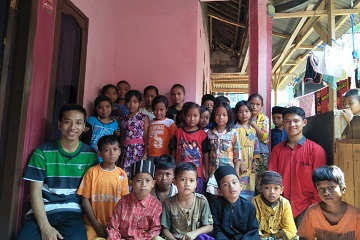Pikacu IPB Team, a Model of Pioneering School in Indonesia

The lack of educational facilities is an obstacle for some remote areas in Indonesia, including Kebon Cau Kampong which is located in Cipinang Village, Rumpin District, Bogor Regency. The high number of children experiencing school dropouts and the low knowledge of the community about the importance of education led the students of Bogor Agricultural University (IPB) to develop a model of pilot school through the House of Inspiration and Education named Pikacu Mencari Cinta.
The students were Duwi Apriyani, Wawan Budi Hantoko, and Nuraeni from the Faculty of Economics and Management (FEM), Mokhamad Inggit Prakasa from the Faculty of Mathematic and Natural Sciences (FMIPA) and Tirta Suarna from the Faculty of Agricultural Technology (Fateta). The program became a finalist of Student Creativity Program in Community Service (PKMM) in 2018, which was guided by Ir. Nindyantoro, MSP.
Duwi said that Kebon Cau Kampong is left behind in terms of education and technology, so it was quite difficult to make early adaptation to the students there.
"Kebon Cau Kampong is a traditional village lacking information media, such as television and others. In addition, this kampong holds the highest dropout rate in Cipinang Village. At first the kids just watched us from their houses, then we talked to the bravest boy to invite his friends and we did introduction one by one with them. Alhamdulillah, there are already nearly 50 children who follow this Pikacu program until now. The parents are also increasingly aware of the importance of education," explained Duwi.
Duwi conveyed that Pikacu Mencari Cinta was aimed to increase reading interest as well as environmental and homeland love.
"Previously, there was a pioneering school, but the study activity was still done on the house terrace of the chairman of the neighborhood (RT) because the primary school has the distance of 5 kilometers. However, the RT's house are not accessible to all people there. Whereas the children there have high spirit to learn, but the lack of facilities and infrastructure inhibits their desire. Through our programs, we hope the children can be more spirit with the facilities we provide," said Duwi.
Duwi also explained eight major Pikacu programs. The initial stage was Patimura (Empowerment of Sakura Team) where Pikacu team socialized the concept of Pikacu Mencari Cinta program to parents, teachers, and students. Furthermore, Sakura team was formed, consisting of the teaching team and the surrounding community, who was responsible for the sustainability of the program.
The main teaching program for the students was to shape reading habit to improve students' knowledge. The program was called Antasari (Reading and Storytelling Actions with Sebaya Group), where students formed learning groups to establish reading habit and to enhance students' knowledge. Pancala program (Reading and Gathering Weeks) was also created by Pikacu team in the form of visits and books borrowing to the library.
The formation of the love character of the homeland and the environment was applied to the students through the program of Mataram (Let's Have Adventure Together) in the form of outdoor games by going around Kebon Cau Kampong and Bogor Botanical Gardens. There was also Akasia program (I Love Indonesia) which was storytelling, role art, singing Indonesian national anthem, and making handicraft from secondhand with the theme 'I Love Indonesia'.
Furthermore, the program for environmental love called Batavia (Children's Favorite Waste Bank) was also delivered. The children deposited the garbage and exchanged it with school equipment based on the value of the garbage. In addition, Pikacu team also made the Garda program (The Invention of Inspirational and Educational House) that has a library and discussion room managed by the Sakura team. Last program was Pikacu Award, consisting of giving awards to all students, as well as art performances and exhibitions of students' creativities.
Duwi hoped that the model of this pioneering school will not only inspire but also be adopted by the government agencies and can be replicated in other areas.
"We are quite concerned about the condition of education in remote areas in Indonesia. There are many pilot schools that have not been paid attention by the government. Hopefully our program can be implemented in other pilot schools. And we also hope the number of dropouts in the village is getting down, at least the children can go to Islamic Boarding School. In addition, the Indonesian government can pay more attention to the facilities and infrastructure of schools throughout the country," said Duwi. (UAM/ZSP/Zul)


